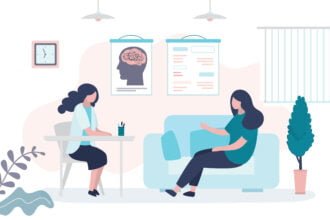When suffering from depression, it can have a knock-on effect on our lives, making everything feel more challenging. Even the smallest thing like getting out of bed can prove challenging, but it can also impact our social lives and make working a struggle.
Fortunately, there is a range of things that you can do to cope with the effects of depression, rather than diving straight into therapy or relying on medication. Here are seven tips to help cope with depression.
1. Connect with your inner circle for support.
When trying to help yourself with the effects of depression, it is extremely important to have a strong network of social support around you. This might mean strengthening the bond with friends or family, to begin with, as having support from those close to you can provide a massive boost to your wellbeing when compared to treatment using medication.
Those who don’t have such a strong support circle of friends and family should consider joining a depression support group, which could be an online support group or one that meets regularly in your local area.
2. Teach yourself how to prevent negative thinking.
Due to the impact of depression, it means not only will you be made to feel bad, but it can often make you have some upsetting and negative thoughts. If you can learn how to block out those negative thoughts, your mood could be boosted significantly.
There is a technique known as Cognitive Behavioral Therapy (or CBT for short) that enables those suffering from depression to recognize common negative thought patterns, and teaches you to train your mind to overcome these cognitive distortions. There is a range of online resources and health apps that explain the steps to practice CBT and relieve negative thinking patterns.
3. Analyze your diet and eating habits
There are a variety of studies that suggest there are strong links between mental health and the foods we put in our mouth, so much so that an improved diet is said to have a positive impact on the effects of mental health disorders.
Nutritional psychiatry has become a viable treatment for depression and other mental health illnesses, and focuses on improving the foods consumed in your diet to impact depression symptoms positively. Before you consider making any dramatic diet changes, such as the introduction of vitamins or supplements, we advise speaking to your medical professional first.
4. Relieve the symptoms of stress
Feeling stressed and suffering from depression are two very different feelings, and when we get stressed, a hormone known as cortisol is produced. This hormone is ok in the short-term as it allows you to overcome the stresses going on in our lives, but long-term stress can cause significant problems such as depression. There are a variety of techniques which should be used often to reduce the amount of stress you are under, which ultimately leads to a lower likelihood of depression.
5. Live life now; don’t put tasks off.
Fatigue and having problems maintaining focus are common symptoms of depression, which can often lead to procrastination.
Depression thrives on putting things off, which can result in feelings of stress, guilt or unnecessary worrying.
As a treatment for depression or at the very minimum to ease the symptoms, it is useful to improve time management by setting deadlines. Set yourself small objectives and try your best to get the priority jobs completed first. Each time you finish a task you have set, you’ll come a little closer to tackling procrastination.
6. Take back control of your home chores.
Household chores such as keeping on top of the bills or even vacuuming the family room can often seem like a marathon when depression sets in.
Feeling of worthlessness will only get worse if there are a pile of dirty dishes, junk all over the floor, and a pile of unopened letters everywhere.
Take back responsibility for the chores at home, and much like procrastination we’ve mentioned above, you should start with small targets and take one task at a time. You could start to feel better about yourself by getting up and being more active, but seeing your efforts to create a tidy kitchen and settle the bills can go a long way to making you feel better.
7. Understand your sleep habits
A low mood and poor sleep go hand-in-hand. Some people have issues drifting off to sleep while others have problems getting out of bed due to feelings of exhaustion.
You could improve the quantity and quality of your sleep by avoiding doing any work in bed or your bedroom, and sticking to using your bed for sexual activity and sleep. Switch electronic devices off an hour before bed and use a reading light to indulge in a relaxing activity like reading before bed, ultimately attempting to improve your sleep hygiene. Bedtime should not be associated with stress; it should be a means for relaxation.
We hope you have found our tips to cope with depression helpful, and please leave us a comment below if you have found any of our advice useful.










